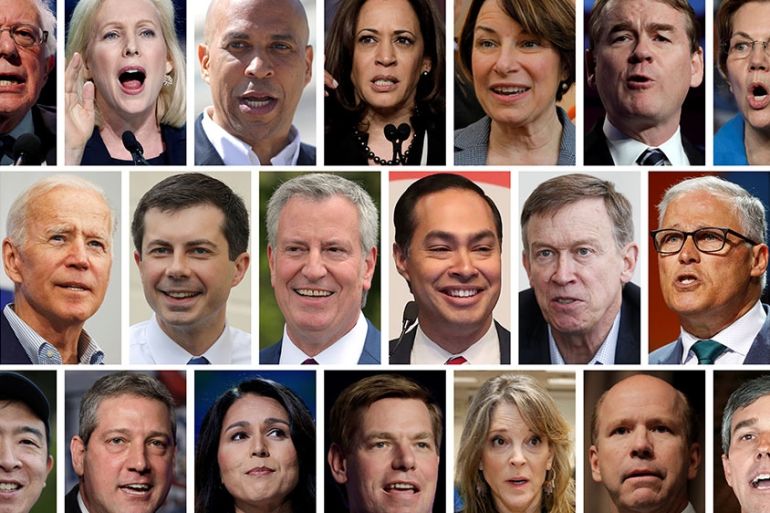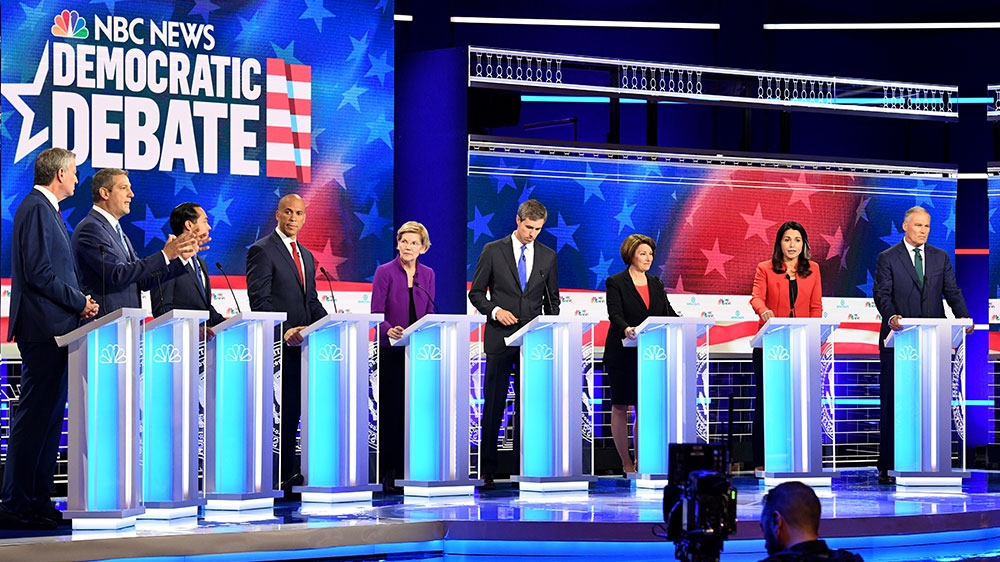First US Democratic debate: Eight things to know
Who will be on stage? What issues do voters want to hear about most? Everything you need to know about the first debate.

The first of several Democratic debates are happening on Wednesday and Thursday in Miami, Florida.
Although most candidates have been on the campaign trail for months, the back-to-back nights of the debate will be the first chance for some to introduce themselves to millions of voters as they seek to defeat President Donald Trump in 2020.
Keep reading
list of 4 items‘Insurrection’ should bar Donald Trump from US presidency, lawyers argue
Ex-Proud Boys leader Joseph Biggs sentenced to 17 years for US Capitol riot
Trump indictments: Key court dates set in Georgia, federal election cases
US foreign policy, immigration, economy, healthcare and climate change will likely be the hot topics on the debate stage.
As 20 candidates prepare, here is what you should know:
1. When and where will the debate take place?
Because the field of candidates is so large, the Democratic National Committee (DNC) and the NBC, which is hosting the first debate in Miami, Florida, split the first debate into two nights: Wednesday and Thursday.
Each night will host 10 candidates.
The debates will last for two hours, beginning at 9pm local time (01:00 GMT). NBC, MSNBC and Telemundo are airing it.
2. Who are the candidates?
Although there are officially 24 candidates (so far), only 20 will be featured during the debate because the other four did not meet the requirements to take the stage.
On Wednesday, Senators Cory Booker, Amy Klobuchar and Elizabeth Warren, Representatives Tulsi Gabbard and Tim Ryan, Washington Governor Jay Inslee, New York City Mayor Bill de Blasio, former Representatives Beto O’Rourke and John Delaney and former Secretary of Housing and Urban Development Julian Castro faced off.
On Thursday, Senators Michael Bennet, Kirsten Gillibrand, Kamala Harris and Bernie Sanders, former Vice President Joe Biden, Representative Eric Swalwell, Mayor of South Bend, Indiana, Pete Buttigieg, former Governor of Colorado John Hickenlooper, entrepreneur Marianne Williamson and startup investor Andrew Yang will go head-to-head.
3. Which candidates won’t be on stage at all?
Four candidates – Montana Governor Steve Bullock, Representative Seth Moulton, Miramar, Florida, Mayor Wayne Messam and former US Senator Mike Gravel – failed to meet the minimum requirements to get on stage.
Candidates had to poll at one percent in more than three separate polls from a DNC-approved list, or raise money from at least 65,000 unique donors.
4. How does it work?
Each candidate will have 60 seconds to answer questions and will be given 30 seconds for follow-ups.
There will be no opening statements, but each candidate will get one minute for a closing argument.
There are five moderators (split up over the two hours). They include NBC News’s Lester Holt, NBC Today show’s Savannah Guthrie, Telemundo’s Jose Diaz-Balart, Meet the Press’s Chuck Todd and MSNBC’s Rachel Maddow.
5. What happened on night one?
Aside from technical difficulties, Wednesday’s debate offered few major surprises as the candidates sought to appeal to voters by highlighting individual platforms and points of divergence.
But it did see some heated exchanges over immigration and healthcare.
Healthcare
Candidates battled over whether to abolish private insurance and shift to a Medicare-for-all system.
Warren and de Blasio were the only two candidates to raise their hands in support of eliminating private insurance.
Warren, a leader of the party’s progressive wing who has been surging in opinion polls, said private insurance was taking advantage of Americans. She backs a government-sponsored Medicare-for-all approach and criticised those who say it is not politically feasible.

Delaney, an outspoken critic of Medicare-for-all who supports a universal healthcare approach that includes private insurance, said Democrats should not throw away a system that some Americans are happy with.
“I think we should be the party that keeps what’s working and fixes what’s broken,” Delaney said.
De Blasio cast the debate as part of “the battle for the heart and soul of our party”.
O’Rourke said private insurance was “fundamental to our ability to get everybody cared for”, but de Blasio cut him off.
“Congressman O’Rourke, private insurance is not working for tens of millions of Americans when you talk about the copays, the deductibles the premiums – it’s not working. How can you defend a system that’s not working?”
Immigration
One of the more heated exchanges on Wednesday night came during the questioning about immigration.
O’Rourke and Castro battled over the separation of families and detention of migrants at the southern border. Castro said he would decriminalise border crossings by migrants, which he said led to the separation of families. He challenged O’Rourke and others to support him.
O’Rourke said that as a congressman he helped introduce a bill that would ensure that those who are seeking asylum and refuge in the United States are not criminalised.
Castro responded: “I’m not talking about the ones that are seeking asylum, I’m talking about everybody else.” He accused O’Rourke of not doing his homework.

De Blasio earned loud applause when he reminded citizens immigrants were not their enemies.
“For all the American citizens who feel you are falling behind and the American dream is not working for you, the immigrants didn’t do that to you,” de Blasio said. “The big corporations did that to you.”
US’s biggest threats
Wednesday night’s candidates gave a range of answers about what they see as the greatest threat facing the US.
China was mentioned by Klobuchar, Castro, Ryan and Delaney.
Climate change was mentioned by Warren, Booker and O’Rourke.
Inslee, who has made climate change the emphasis of his campaign, pointed instead to Trump.
Gabbard and Delaney pointed to a potential nuclear war. Klobuchar also mentioned Iran.
And de Blasio said Russia because the country “is trying to undermine our democracy”.
6. What are the top issues for voters?
A recent Morning Consult/Politico poll showed Democratic voters want to hear from candidates about their plans for climate change, gun policy and recent abortion legislation.
Other issues voters said they cared about going into the debate included Medicare-for-all implementation, immigration, education reform and relations with Iran.
7. When is the next debate?
The next series of debates will take place on July 30-31. It will be hosted by CNN in Detroit, Michigan.
8. What will Trump be doing during the debate?
Trump was en route to Japan for the G-20 summit on the first night of the debate.
The president tuned in from Air Force One and did not miss the chance to knock his would-be opponents on Twitter.
His verdict as the evening got underway: “BORING!”
